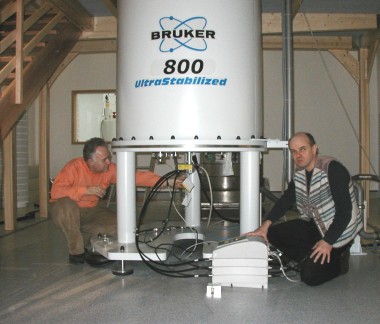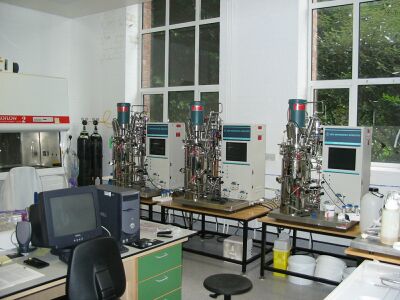 |

EBNU
 How to Find us
How to Find us
 People in EBNU
People in EBNU
 Group
Group
Publications
 Structure Gallery
Structure Gallery
 Facilities
Facilities
 Funding Sources
Funding Sources
 Vacancies
Vacancies
Group Information
 Group Seminars
Group Seminars
 How tos
How tos
Spectrometer
bookings:
 High Field
High Field
 Departmental
Departmental
Service
|
 |
 |
 |
NMR Spectrometers
Currently we have four NMR spectrometers:
one 800 MHz and two 600 MHz
Bruker Avance, 4-channel spectrometers and one 500 MHz DMX.
One of the 600 MHz spectrometers and the 800 MHz spectrometer are equipped with cryoprobes.
The instruments are equipped with a range of probes, including triple-resonance,
single and triple-gradient probes, and inverse- and direct-detection 5 mm probes.
We also have a 600 MHz SENSY HR-MAS probe which is used for acquisition
of spectra of small compounds on solid support.
The High Field NMR laboratory benefits from dedicated supervision by
our NMR manager, Dr. Juraj Bella (right).
Our students and researchers also have access to the NMR service
instruments of the School of Chemistry, in particular the 250 and
360 MHz Bruker instruments equipped with a sample changer.
The expertise is available to apply a wide variety 1D-4D homo- and
heteronuclear methods for the determination of structures and interactions
of proteins, carbohydrates and small molecules.
We will consider a limited amount of contract work. For further details
please contact
Dr Dusan Uhrin (left).
|
Laboratory
We are very well equipped for all aspects of manipulation of microorganisms
and for expression and purification of recombinant proteins (fermenters,
extensive HPLC and FPLC facilities). This includes access to many analytical systems such as
protein/DNA sequencing and mass spectrometry (LC-MS, Electrospray, APCI, MALDI-TOF,
Q-TOF, FTICR, FAB and EI).
For more details about some of our facilities visit the
Edinburgh Protein Interaction Centre.
|

|

|
Computation
As well as our NMR facilities, we are equipped for
data processing, protein structure determination and modelling.
Presently we have a variety of Linux workstations, SGIs,
O2's and an SGI INDIGO-2 10000, some of which were purchased with the JIF fund awarded to the
Edinburgh Protein Interaction Centre.
In addition, we also have a number of single and double processor Linux
workstations and, with the
Crystallography Department,
we share a Silicon Graphics Challenge Server with six, 200MHz R10000 processors.
|
|



